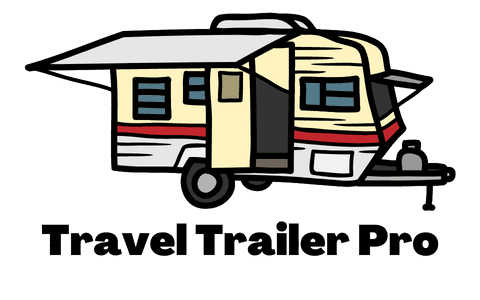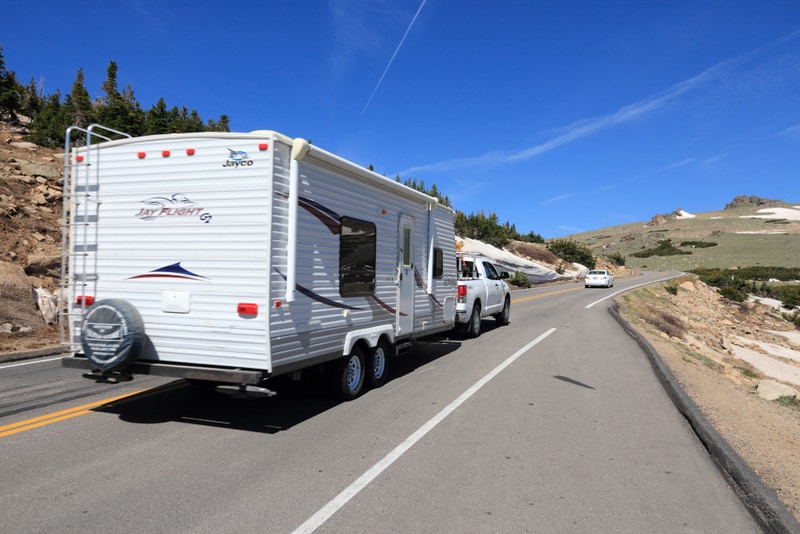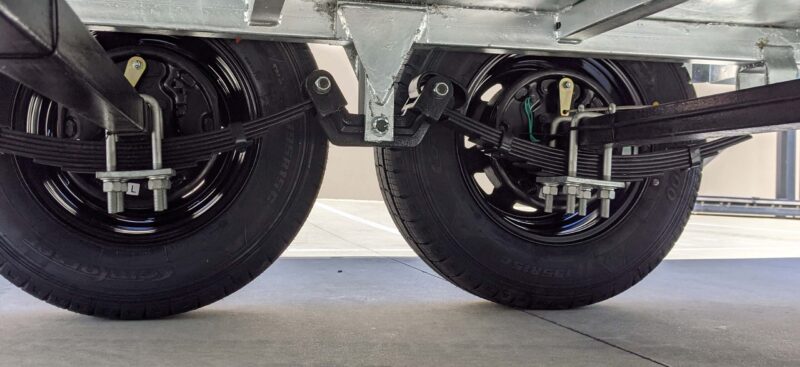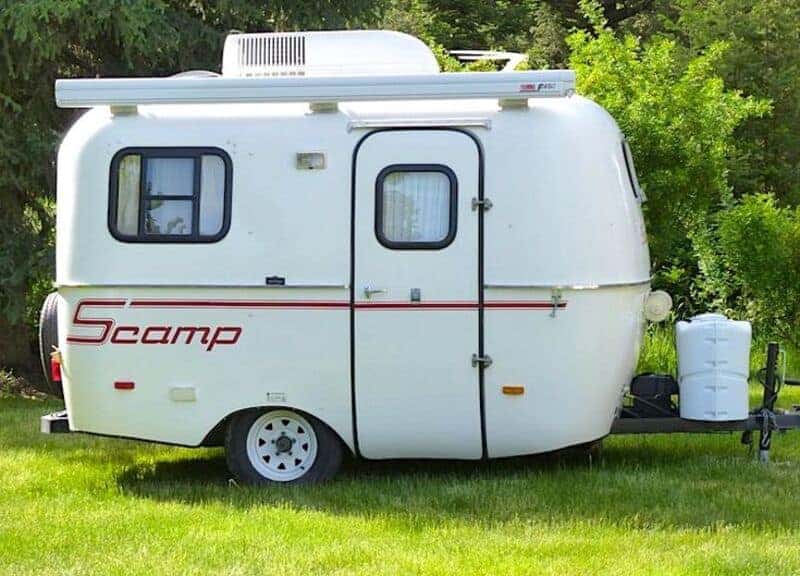There is no question as to whether camper trailer brakes make towing safer. But are they required by law? Depending on the state you are in, there may be different requirements for trailer brakes. Our fifth wheel has a brake system, so we are legally safe wherever we travel.
You should always check the law before you hit the road. If you don’t have trailer brakes, you may be in violation.
You should know, however, that towing a trailer without its own braking system means that the tow vehicle will have to work to stop itself and the trailer. Without the added braking ability there will be a longer stopping distance and it could cause an unsafe situation if the trailer is heavy enough.
Do Camper Trailers Have Trailer Brakes?
Generally, camper trailers do have brakes, but not necessarily all of them. Trailer weight determines the legal requirement for trailer brakes. Smaller trailers may not have brakes because the tow vehicle should have sufficient brakes to stop both itself and the trailer. It also depends on the laws in your area.
Camper trailers can have one of two types of braking systems—electric or hydraulic.
Not all camper trailers have brakes, depending on the weight rating. Trailer brakes ensure safe and controlled braking for the trailer. Generally, a trailer over 3000 pounds must have brakes on all wheels. Some states require braked axles on trailers with a GVW as low as 1,500 pounds.
Are Camper Trailer Brakes Required By Law?

Trailer brakes are required by law in all 50 states, but each state has its own requirements. For example, California, Idaho, Nevada, New Hampshire, and Oregon require brakes for all trailers that are more than 1,500 pounds.
Kansas and Ohio set their requirement at 2,000 pounds. Some 36 states require a brake system on any trailer weighing 3,000 pounds or more.
States such as Delaware, North Carolina, and Rhode Island, require brakes on trailers of 4,000 pounds or more, and Alaska requires them when the weight is more than 5,000 pounds.
If you are registering your trailer in Texas, the requirement is 4,500 pounds, Massachusetts is 10,000 pounds, and Missouri only requires that fifth-wheel trailers have an independent braking system.
In some locations, a tow vehicle-to-trailer weight ratio is used. For example, a 40 percent ratio would mean a 4000-pound tow vehicle would require trailer brakes if the trailer were more than 1600 pounds.
How Do Trailer Brakes Work?
A trailer can have one of three common types of brake systems.
Surge Brakes:
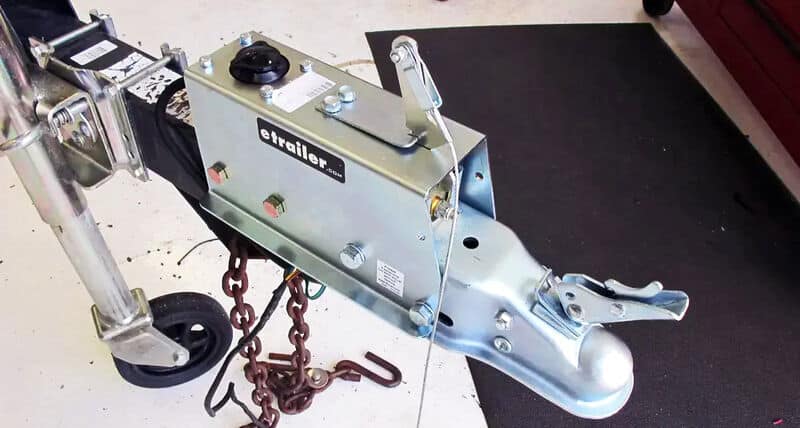
Surge brakes are separate from the tow vehicle’s brake system. These types of brakes sense when the tow vehicle slows and forces hydraulic fluid onto the trailer brakes.
This system is self-contained in the trailer and does not require a brake controller. The more stopping force from the tow vehicle creates more stopping pressure from the trailer brakes.
This braking system is generally reliable, with fewer parts that could go bad over time. However, you must consider a longer stopping time over a further distance.
Surge brakes can fail if the hydraulic system develops a leak or if there is air in the system.
Electric Brakes:
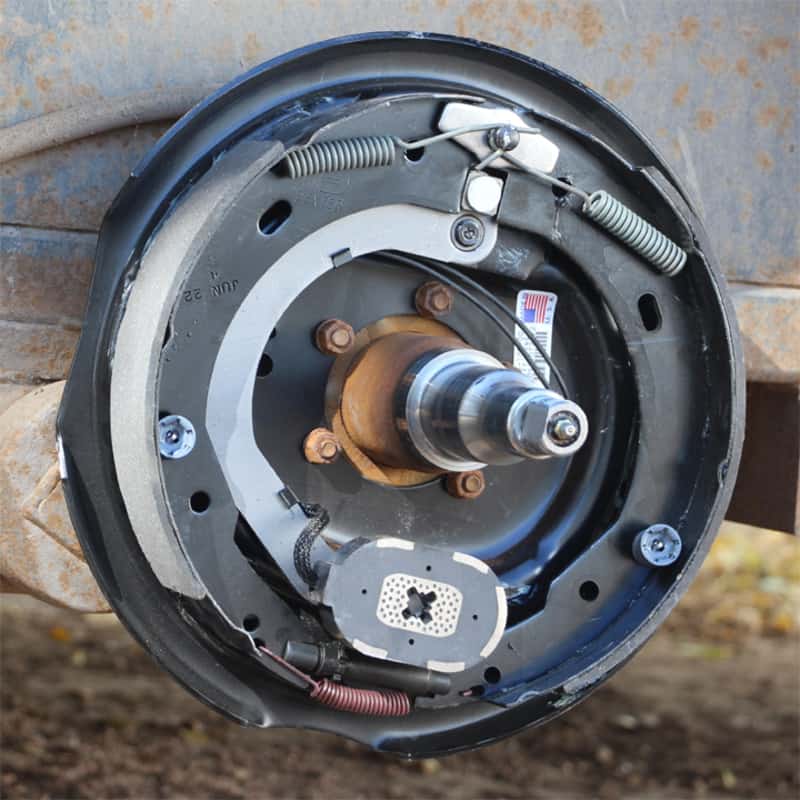
Electric brakes are the most common braking system. This system relies on the tow vehicle to power the trailer brakes.
The brake controller in the tow vehicle sends a signal to the trailer brakes to apply pressure. You can adjust the brakes in the truck cab to apply more or less pressure.
It’s important to note, that electric brakes will not work without a brake controller. Brake controllers come in either 12-volt or 24-volt varieties and need to match the power source of the towing vehicle.
Some problems that can occur with electric brakes include low or no voltage and amperage at the brakes caused by poor electrical connections, open circuits, insufficient wire size, broken wires, blown fuses, or improperly functioning controllers or resistors.
Emergency or Break Away Brakes:
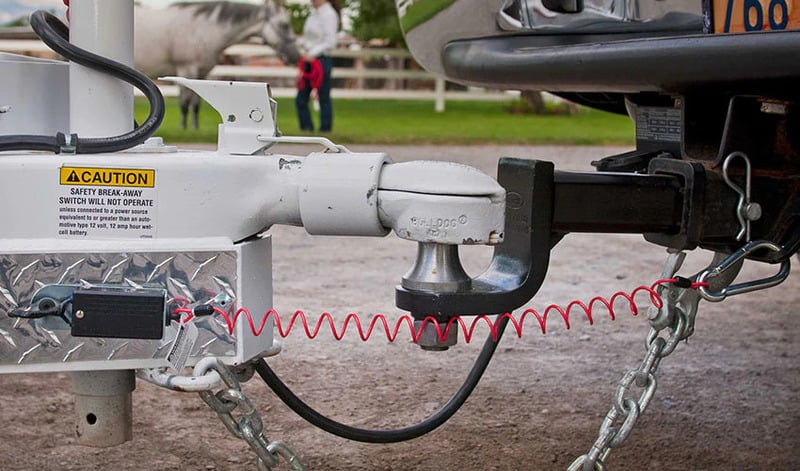
Travel trailers and fifth wheels are required to have a safety braking system.
Here is how it works. A cable from the breakaway switch is attached to the tow vehicle. If the two are separated, a pin is pulled out of the switch which activates the brakes on the trailer to slow and eventually stop the trailer.
Can You Add Trailer Brakes to Your Camper?
Yes, you can add trailer brakes to your camper. Depending on whether you do the work yourself or have it done, you could pay around $400 for brake parts and more for labor. If you are good at working on your own vehicles, or even if you’re not, there are plenty of YouTube videos that can help with the process.
How Often Should Trailer Brakes Be Replaced?
Some say that your trailer brakes should be replaced every 2 years or 12,000 miles. Several factors can affect those numbers and it’s critical to monitor your trailer brakes and replace them as required.
Type of Road
If you drive frequently on mountainous terrain, you will likely need to replace your brakes more often.
Load and Weight
Load and weight can affect brakes—even those that get little use. A CAT scale is a great way to know how much you are towing and might entice you to ditch some of the weight.
Trailer Usage
If you are a full-time RVer traveling from place to place all year long, your brakes will get a lot of wear. Make sure you have them inspected at least once a year. The more miles you put on your trailer, the more often your brakes will require maintenance.
You can use an online tool like RV Life Maintenance to keep track of your RV brake maintenance and to receive reminders when maintenance is due.
Type of Brakes
Different types of brakes have different durability and maintenance requirements. Cheaper is not better when it comes to keeping your family and belongings safe. Make sure you purchase high-quality brakes that will last a while.
Driving Habits
I’ve seen too many people pulling trailers at high rates of speed. This is dangerous and will wear on your brakes if you must stop suddenly. Tailgating is also hard on brakes when you have to use them more often.
Driving at or below the speed limit will not only keep you safer but will also allow you to have a shorter stopping distance. Softer braking equals less wear on the brakes and longer life.
What Size Camper Trailer Needs a Brake Controller?
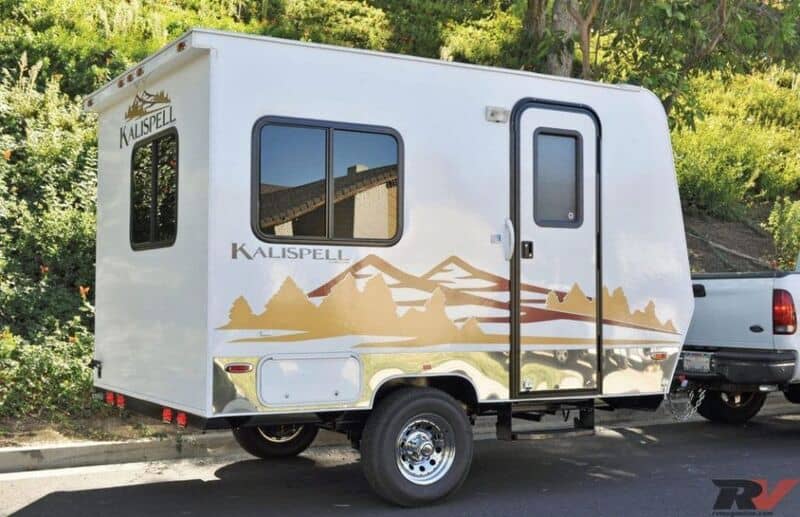
You’ll need a brake controller if the trailer you’re towing is equipped with electric or electro-hydraulic brakes. Otherwise, there is nothing to tell the trailer’s brakes when to operate.
Federal laws that regulate commercial vehicles indicate that trailers with a loaded weight of more than 3,000 pounds require brakes.
Final Thoughts About Camper Trailer Brakes
Camper trailer brakes are an important part of your RV’s safety features. Trailer brakes help your tow vehicle to stop quickly, keeping you and your family safe on the road.
While not all states have the same regulations, most states do require that you have trailer brakes.
Most trailer brakes should be replaced every 12,000 miles but that wholly depends on many factors such as the type of roads you drive.
Frequent trips on steep roads might require you to replace your brakes more often. Load and weight can also affect brakes. Make sure to load your RV evenly and make use of a CAT scale to get an accurate weight on your trailer.
Make sure to have your brakes inspected at least once a year and more often if you RV full-time.
Finally, make sure you consider your driving habits. Do you drive too fast? This is a dangerous habit and could wear on your brakes if you must stop suddenly. Make sure you drive around 60-65 miles per hour, even if the speed limit is faster.
Keep a good stopping distance from the vehicles ahead of you and most of all, keep your family and your RV safe for your next adventure.
Related Reading:
– 10 Best RV Tire Pressure Monitoring Systems
– How Often Should You Grease Travel Trailer Wheel Bearings?
– How Often Should Travel Trailer Tires Be Replaced?
About the Author:
Terri Nighswonger and her husband Todd have been RVing and work camping for five years with their Cavalier King Charles Spaniel, Newton, and their Minnie Australian Shepherd, Remi.
They originate from the Midwest but plan to enjoy the West for a few years, wintering in Arizona and summering wherever the road may lead. Writing is Terri’s passion, but she also loves hiking, kayaking, walking her dogs, and anything she can do outdoors.

